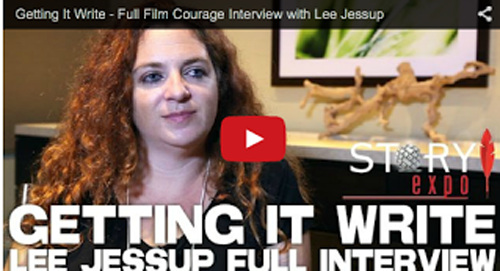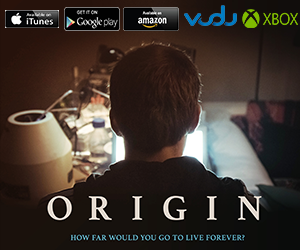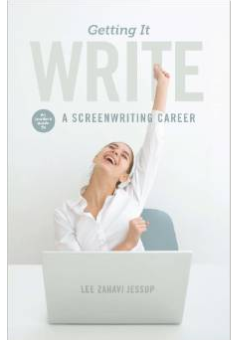Film Courage: What is the screenwriting path to failure?
Lee Jessup: I love that question! I actually adore that question because I think everybody has this idea about failure, but nobody knows what it is. Right? “I’m going to fail and go down in flames and…” No, you’re not.
The only failure in screenwriting is not writing. “I wrote this script 5 years ago. I am running around with this one script. I haven’t touched a computer or typewriter since then for any creative purposes.” That is screenwriting failure. Not writing new content. Not generating new content. Harping on old content. Not getting notes – huge, huge in the failure of things!
“While writing is solitary, this is a highly collaborative industry. So the road to failure is not writing, not writing new material, not getting notes, wanting to be perfect. There is no perfection in this industry. It is all about getting notes, learning from notes, getting notes that you hate, figuring out what to do with them, because other people are going to have to buy in.”
If you are tunnel visioned and this is how it has to be and anything short of this, as I saw it on the page arrives on the screen, that it will be my failure.
You will fail in that. While writing is solitary, this is a highly collaborative industry. So the road to failure is not writing, not writing new material, not getting notes, wanting to be perfect. There is no perfection in this industry. It is all about getting notes, learning from notes, getting notes that you hate, figuring out what to do with them, because other people are going to have to buy in.
So the road to failure is really being stunted.
Film Courage: What is being too perfect? I think a lot of people who try to be too perfect don’t realize it.
Lee Jessup: It’s always thinking that it can be better. And you know what? Most work can be better. But there is a point of diminishing returns, right? There is a point where you are switching around, you are wordsmithing. The returns are you improve it be a percent, by half a percent, that is not going to do it. So when is the work ready? When is it strong enough? When do you believe in your work? A lot of writers feel very confident writing, but not confident in getting the work out there. So at some point you have to understand that this is what the work is, this is what I wanted it to be.
I’m a big believer in feedback, so getting feedback from people that you trust who have some experience and knowledge in the industry, be they other writers in the industry or consultants like Michael Hauge or Jen Grisanti that you [FilmCourage] had talked to or script readers who are known for being really hard on the work. When they say “You know what, it’s good.” Get it out there, at some point you have to let go. At some point you have to say, “Yeah, I can futz with it forever” and you can. I promise you that you can. I have seen screenwriters do it and I have had fights with writers who would just harp on the same script.
You have to accept it for the potential that it has. You have to question whether you’ve realized that potential. Did you do what you wanted to do with that script? Did you write the story that you wanted to tell? Is it being received in the manner you wanted it to be received? So are people getting it, are they connecting with it? Are they enthused by it? If the answers are “Yes,” then you get it out there.

Watch the video interview here on Youtube
As much as rejection is part of the job, you are going to get rejected and so you better develop a tougher skin. You will be rejected. Get it out there. The point is to get that Yes. And you have to get through a lot of No’s to get that Yes. But you have to get the work out there. You have to get the work out there! It does no good sitting on the shelf. It does no good sitting on the computer without anybody seeing it.
Of course you want to scrutinize if the work is up to par. You want to make sure that the work is strong and you are getting the feedback from people who don’t have to be nice to you. And that is a really big thing, so it can’t be your friends who are concerned about maintaining a friendship who are going to be a little bit more forgiving because they understand your intention. They know what you went for, you didn’t quite get there but they saw it enough.
But people who will scrutinize your work and be demanding of it are telling you “It’s good. Get it out there. Get it out there.” That is how you build a career. You don’t build a career with one script that you are precious about. You build a career writing great script after great script and getting a fan base that is excited to read the next thing. They know that the next thing is coming and want to be the first on the list to get it from you.
Watch all of Lee Jessup’s Film Courage video interviews on Youtube here
.
Getting it Write: An Insider’s Guide to a Screenwriting Career
by Lee Zahavi Jessup
.
.
CONNECT WITH LEE JESSUP
Leejessup.com
Facebook.com/leezahavijessup
Twitter.com/leezjessup

STORY EXPO is the world’s biggest convention of writers from all mediums – screenwriters, TV writers, novelists, filmmakers, gamers, journalists, graphic novelists, actors, business people, comic book writers and more. Featuring over 110 world-renowned speakers, 100+ classes and 30+ exhibitors, Story Expo covers all aspects of story and writing – from craft to business to pitching to career.
Learn how and where your story is best told to achieve its greatest success both financially and creatively. Take control of your stories by learning the craft, learning which medium your stories are best told, understanding the business of storytelling, identifying and using the tools and resources available to you, understanding how to package and pitch your ideas and scripts, and using social media and other techniques to start and maintain a successful writing career. Also be able to pitch your scripts and stories to top production companies, agents and managers in our Story Expo Pitching Room . This year’s Pitching Room has extraordinary companies and agencies like ICM, APA, 3 Arts and more! Plus network with your peers from around the world during a fun, over-the-top weekend. Story Expo is like Comic-Con…but for writers.
CONNECT WITH STORY EXPO
StoryExpo.com
Facebook.com/OfficialStoryExpo
@StoryExpo
Advertisement

Watch ORIGIN on iTunes Starting December 13, 2016
ORIGIN: Three science students are on the verge of making a breakthrough in their research into biohacking and cell aging. When one of them is diagnosed with a terminal illness, they break moral boundaries and use their untested research on him, in an attempt to save his life.

Watch it on iTunes here!
COLD NIGHTS HOT SALSA takes you inside the international dance world of Victor and Katia, aspiring young salsa dancers from Montreal, who seek to win a World Salsa Championship.
During their three-year quest Victor and Katia draw upon the talents of Eddie Torres, Tito & Tamara, Billy Fajardo, and Katie Marlow. Central figures in the salsa dance world, these mentors put their passion and professional dance skills before you and reveal what it takes to perform and compete at the highest level.
Victor and Katia’s story is a love story. It’s the story of their love to dance and of how being a couple enhances and also complicates their life together and dance ambitions. After winning the Canadian Salsa Championship, we watch as they first compete in the 3rd World Salsa Championship. They return home to Montreal to work on taking their dance skills to a higher level. After months of preparation, including working with a number of key mentors, they put their dreams on the line and travel to Florida to compete in the 4th World Salsa Championship.
Along with Victor and Katia’s story, the film explores some of the social and historical roots of salsa, as told through Eddie Torres, Billy Fajardo, Tito Ortos, and Edson Vallon.
Experience the beauty and excitement of competitive dance, the compelling force of world leaders in salsa, and the romantic charm of two young dancers who want to make their mark on the Latin dance world.



























Pingback: Road To Failure For A Screenwriter by Lee Jessu...